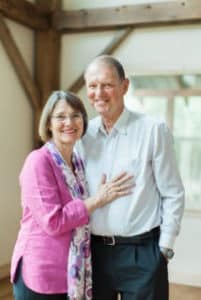This is the second in a 3-part series:
- Quiet Time 1: Importance of Quiet Time with God
- Quiet Time 2: Should we follow a fixed structure?
- Quiet Time 3: Elements of a Quiet Time
Watch the video or read the transcript…
Video Transcript
Hi, it’s Ross Paterson here.
I’m going to chat for the second time about the Quiet Time. There will be three talks in this series. I am just emphasizing something very simple.
Again, do email us or go to our website, there’s good material there for cross-cultural work and for (to some extent) the Christian life in general.
Now last time – and I’ll be very quick as there’s no need to really repeat – I looked at three questions: What is the Quiet Time? What does it have to do with cross-cultural mission? And what is the problem?
The Balance Between Legalism and Being Too Casual

And you remember, I talked from Selwyn Hughes on the balance between legalism and too casual an attitude. About legalism, he said: “In my youth, I heard one Bible teacher say, ‘If you don’t begin every day reading a chapter of the Bible and spending at least 30 minutes in prayer, then you have no right to go into the day expecting God to bless it.’ And Selwyn Hughes feels that’s rubbish and I do also,. There are good reasons sometimes (maybe you’re catching an early flight or you have to be at a very early meeting, whatever) where that’s not possible. We’re talking about a practice, not a law.
But also we dealt with the too casual attitude, where folk kind of feel “well if the Holy Spirit moves me, I’ll spend time with the Lord, but I don’t need to.”
Now I want to move from there to something important, that I’m saying with Selwyn Hughes here, because he has another helpful quote. I want to urge us that we avoid pendulum Christianity.
What is Pendulum Christianity?
What do I mean by that? Well, we have legalism first and then we react against legalism, by saying “anything that we consider legalistic we don’t do. Oh it’s legalistic to have a Quiet Time in the morning, so I’m not going to do that. Or in the evening or whenever you do it.”
So let me address that by sharing again from Selwyn Hughes. I do urge you, brothers and sisters, to avoid pendulum Christianity. If you look at the way we behave as Christians, we go one way, and then we react against that, but we go the extreme in the other way.
This is what he said, (and he was around before I was, so it’s going perhaps a little bit beyond my day). Selwyn Hughes said, “In the early days of charismatic Christianity, many of its leaders from the historic denominations, who had been fed on a diet of legalism, began to emphasize quite rightly the joy of knowing Jesus’ presence through the indwelling of the Spirit every hour of the day.”
So they were saying, “I can experience the presence of the Lord, which is wonderful. I can experience it through the day, it’s not just in my Quiet Time.” In other words, the legalism against which they were reacting says “if I’m in my Quiet Time, God is there, but he leaves me for the rest of the day.” Selwyn Hughes again: “I often used to hear people say, in charismatic services, ‘Now I don’t have to have a daily Quiet Time in order to feel God’s presence, I can feel it (i.e. God’s presence) every hour of the day. Every waking minute is a Quiet Time.”
“While true,” Selwyn Hughes says, “this thinking is also dangerous, many came to believe that they could get through the day simply by speaking in tongues. Nothing will or can be a substitute for the private and personal time that we spend in communion with God.”
So, dear ones, let’s avoid pendulum Christianity, swinging from extreme to extreme.
Should we have a plan for Quiet Time or Just be Spontaneous?
Now I want to discuss another issue: Should we have a plan or should we just be spontaneous? In other words if we’re going to have a Quiet Time, should we have a plan? Should we be kind of, “this is the way we do it and we do it the same every day” or just be spontaneous?
Now again I’m going to stay with Selwyn Hughes, because I think there are some wonderful comments that he made:
“When people came up to me at seminars or conferences and asked: ‘How can I develop a better relationship with God?’ I invariably replied (notice ‘replied’ is past tense), “Spend time with Him. The more time we spend with our families and friends, the better we get to know them. It is the same with God too. People often asked me to give them a plan on how to have a Quiet Time. Here is one I used to give people many years ago. Decide on the amount of time you can spend, preferably in the morning. (The morning is best because it tunes your soul for the day.) Having fixed the time, stick to it. Take your Bible and a notebook and read the passage carefully. Let it (The Word of God) soak in. Make a note of anything that comes to you. Follow this with prayer, mentioning any requests or personal petitions you may have. Finally, relax and listen expectantly to see if God has something to say to you. It is far easier to talk than listen, so don’t worry if for some weeks or months nothing comes. Tuning in to God takes time and practice.”
So what he saying is: Read the Bible, let the words soak in, then pray, then spend time waiting on the Lord. But interestingly he added something to that. This is what he said:
“Read the Bible, let the words soak in, then pray, then spend time waiting on the Lord”
“However, later I was reluctant to give people that plan without highlighting the pitfall of depending on a structure rather than on the direction of the Holy Spirit. I imagine most of us would prefer to spend time with God with a plan more than to abandon ourselves to the Holy Spirit and wait upon Him. A structure can be useful and helpful, but as we learn to be alone with God we can, on occasions, simply enjoy His company and presence without even saying a word. Time with God becomes more live when we approach it with passion instead of a plan. Good marriages thrive on spontaneity, special intentional occasions and passion. So does a relationship with the Lord.”
So I find that interesting. I think actually the plan Selwyn Hughes gave is a really good one, but he’s saying, “Let it be a foundation, and not a rule – don’t get back to legalism again.”
Now let’s move on. Selwyn Hughes made the comment that Jesus had two customs.
- One of Jesus’ customs was to go regularly to the house of God. Luke 4:16 “On the Sabbath he went into the synagogue as was his custom. One custom was to go regularly to church.
- The other custom was to pray regularly.
Those were Jesus’s customs.
The Word of God in the Quiet Time
Now I want to switch to another topic at this point. The topic is the importance of the Word of God (the Bible) in the Quiet Time. Would you allow me to have some fun? Over the years as I read, as I have my own Quiet Time, I gather quotes from a variety of people, I love to collect quotes. And I’m going to, hopefully not bombard you, but bless you, with quotes. They are all to do with the importance of the Word of God. You see I think that there is a drift away from the importance of Scripture. I think there’s a danger of this kind of, “Well I just hear the Holy Spirit and I’m following him.” It’s one of these pendulum things. Jesus said, “You’re wrong because you know neither the Scriptures nor the power of God.” We need the Scriptures and we need the power of God. So let me finish this little section with some quotes.
From Acts 17
Acts 17:11 says: “These Jews (the Bereans) were more open-minded than those in Thessalonica, for they eagerly received the message, examining the Scriptures carefully every day to see if these things were so.” Scripture Union comments: “They also received the message with ‘great eagerness’. This is the Greek prothumos, denoting enthusiasm and zeal, such as that of a ravenously hungry man devouring the food set before him….”
Willow Creek Church
So these believers were hungry for God’s Word and the writer I think a Scripture Union writer added, “The Willow Creek Church (a very famous church in the States), after researching spiritual growth in 1,000 churches across America, concluded, ‘The Bible’s power to advance spiritual growth is unrivalled by anything else, we have discovered. Reflection on Scripture is by far the most influential spiritual practice’ (Luke 6:46, CEV).
Willow Creek investigated a thousand churches, and came to the conclusion that the Bible is the most significant element in spiritual growth – nothing else comes near it. That’s a review of a thousand churches!
Jonathan Edwards
Jonathan Edwards, who was involved in revival in early America, wrote: “Our public assemblies were then beautiful. The congregation was alive in God’s service. Everyone earnestly intent on the public worship. Every hearer eager to drink in the words of the minister as they came from his mouth. The assembly in general were from time to time in tears while the Word was preached. Some weeping with sorrow and distress, others with joy and love, others with pity and concern for the souls of their neighbours.”
I say: “Lord do that again, please, please. Where the preaching of the Word in our hearts has that authority and impact.”
Let me share two more quotes!
About Butterflies and Bees

Word For Today wrote: “Butterflies cover more ground, but bees gather more honey. That’s because the butterfly just flies over the flowers, whereas the bee lands on each one and stays there long enough to extract the nectar. That’s the difference between merely reading your Bible for a few hurried minutes, and taking time to meditate on what you’re reading.”
A Word from John Calvin
And finally “John Calvin believed passionately in the power of Scripture to bring clarity to our confused understandings of God. The Bible, he suggested, worked like the spectacles that focus the fuzzy letters on a page into meaningful words. Revelation, Calvin’s metaphor implies … corrects the astigmatism of the sinful imagination … freeing us to see clearly what has been there all along”
Whether you’re Calvinist or not the quote is a great one. The Bible takes those fuzzy letters that we can’t quite read, that understanding of life and the rest that we don’t quite understand, and works like spectacles that focus the fuzzy letters on a page with meaningful words.
I’m going to leave it there. Whether we have a plan or whether we’re more spontaneous, what I am saying is, dear ones, we must include the Bible. We must spend time in the Word of God.
Conclusion and Closing Prayer
“Lord Jesus, help us, we pray. Thank you for this treasure, this Word that you given us. This amazing book, the Scriptures, that I for one have read for over 50 years, and still even this morning there are new truths – new things from your Word. Lord, refresh us, to escape from this generation which so easily – young or old alike – ignores your Word, and let us make your Word our treasure, our light on our way, in Jesus name. Amen.”
If you enjoyed reading this Quiet Time resource for Christian Missionaries, then check out our courses.
<< Part 1: Importance of Quiet Time with God
Part 3: Elements of a Quiet Time >>
God Bless You.

Ross Paterson



